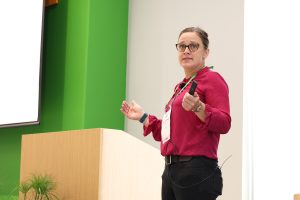Utilizing genetic selection to reduce the environmental impact of cattle.

“There is some ability to select animals that produce less methane, which is pretty good news for us, because we can tell a really good story if we are able to handle this problem,” said Christine Baes, University of Guelph. Baes was a featured speaker during the 2024 Beef Improvement Federation (BIF) Symposium June 12 in Knoxville, Tennessee.
Baes’ talk centered around the role genomic research can play in enhancing the efficiency and sustainability of beef cattle. She highlighted how innovative genomic selection can significantly reduce methane emissions, improve fertility and increase the overall productivity of cattle.
“When we measure, about 492 grams of methane is produced by a lactating dairy cow each day… but there’s about 30 percent variation between individual animals,” she explained. This variation means that there is an ability to reduce methane emissions through genetic selection.
She went on to emphasize the importance of collecting and analyzing phenotypic and genomic data in order to achieve these objectives. She described various projects and collaborations aimed at reducing methane emissions that have integrated advanced technologies.
“Using mid-infrared spectroscopy (MIR) data, which is routinely collected from animal on milk recording, we can predict how much methane those cows produce with high accuracy,” she said. “We’ve got data on almost 90 percent of our animals, so collecting and storing that information was a really important decision.”
A key point throughout Baes’ talk was the concept of breeding resilient animals. “A resilient animal is able to adapt rapidly to changing conditions without compromising its productivity, health, or fertility while becoming resource-efficient and reducing its environmental burden,” she explained. This approach not only aims to enhance the productivity and health of the cattle but also address environmental concerns surrounding them, making the industry more sustainable overall.
Baes also touched on the public perceptions about these potential advancements. She referred to a Canadian survey where “almost 50% of people said yes” when asked if they would be happy if selective breeding was used to solve the environmental impacts of the dairy industry. According to Baes, this is a positive indicator of the potential support of these advancements if implemented in the beef industry.
Baes’ presentation gave an overview of how genomic research and advanced data has the opportunity to transform the beef industry, reducing its environmental footprint while enhancing productivity and animal health.
“We can send out a very positive message. Let’s roll up our sleeves and figure it out,” Baes summarized.
To watch the full presentation, visit https://youtu.be/sfbgw0vsvVQ. For more information about this year’s Symposium and the Beef Improvement Federation, including additional presentations and award winners, visit BIFSymposium.com.
